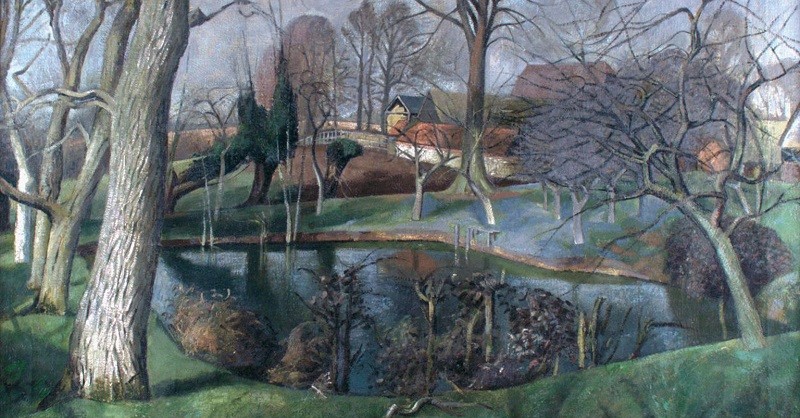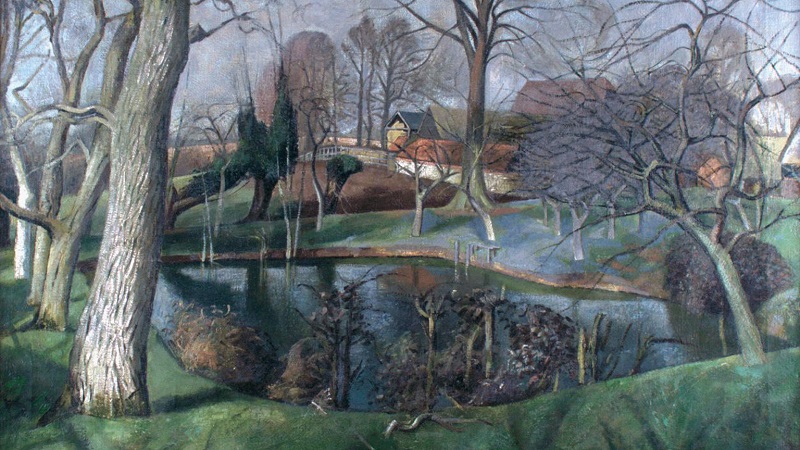What is the essence of true poetry? Edward Thomas provided one answer…
Edward Thomas wrote all of his poems between December of 1914 and January of 1917. Some have suggested that this creative period was a sort of “miracle,” given that Thomas had not previously written poetry. I disagree. If there was any “miracle,” it was the fact that Thomas and Robert Frost met each other in 1913. Moreover, Thomas’s prose writings prior to 1914 show, first, that he knew English poetry inside and out, and, second, that he had long thought about — and felt — the essence of true poetry.
His discussion of a poem by John Clare reveals the depth of Thomas’s thoughts and feelings on the subject of poetry. He begins by quoting in full the following untitled poem by Clare:
Love lives beyond the tomb,
And earth, which fades like dew!
I love the fond,
The faithful and the true.
Love lives in sleep:
‘Tis happiness of healthy dreams:
Eve’s dews may weep,
But love delightful seems.
‘Tis seen in flowers,
And in the morning’s pearly dew;
In earth’s green hours,
And in the heaven’s eternal blue.
‘Tis heard in Spring,
When light and sunbeams, warm and kind,
On angel’s wing
Bring love and music to the mind.
And where’s the voice,
So young, so beautiful, and sweet
As Nature’s choice,
Where Spring and lovers meet?
Love lives beyond the tomb,
And earth, which fades like dew!
I love the fond,
The faithful and the true.
After quoting the poem, Thomas writes: “This and perhaps all of his best poems show Clare as one of those who have in them the natural spirit of poetry in its purity, so pure that perhaps he can never express it quite whole and perfect.” Thomas then comes to the heart of things:
Here, I think, in ‘Love lies beyond the tomb,’ in this unprejudiced singing voice that knows not what it sings, is some reason for us to believe that poets are not merely writing figuratively when they say, ‘My love is like a red, red rose,’ that they are to be taken more literally than they commonly are, that they do not invent or ‘make things up’ as grown people do when they condescend to a child’s game. What they say is not chosen to represent what they feel or think, but is itself the very substance of what had before lain dark and unapparent, is itself all that survives of feeling and thought, and cannot be expanded or reduced without dulling or falsification.
If this is not so, and if we do not believe it to be so, then poetry is of no greater importance than wallpaper, or a wayside drink to one who is not thirsty. But if it is so, then we are on the way to understand why poetry is mighty; for if what poets say is true and not feigning, then of how little account are our ordinary assumptions, our feigned interests, our playful and our serious pastimes spread out between birth and death.
Edward Thomas, Feminine Influence on the Poets (1910), page 86.
This is the wisdom and the sensibility that Thomas already had in him when the time came for him to (at last!) write his poems. And what he said in those poems is — above all else — “true and not feigning.” I am reminded of what Kingsley Amis said of Thomas in The Amis Anthology: A Personal Choice of English Verse:
How a poet convinces you he will not tell you anything he does not think or feel, since you have only his word for it, is hard to discover, but Edward Thomas is one of those who do it.













What Thomas says here is quite close, isn’t it, to Wallace Stevens in an Ordinary Evening in New Haven –
‘The poem is the cry of its occasion,
Part of the res itself, and not about it.
The poet speaks the poem as it is,
Not as it was…’
What a wonderfully sensitive critic Thomas was.
Nige: Thank you very much for bringing in the wonderful passage from Stevens. He hadn’t occurred to me in this context, but I agree with you completely: it summarizes Stevens’s entire project, doesn’t it? I think of this as well (among many examples): “There it was, word for word,/The poem that took the place of a mountain.//He breathed its oxygen,/Even when the book lay turned in the dust of his table.” (“The Poem that Took the Place of a Mountain.”) I also agree with you about Thomas as a critic. He reminds me a great deal of Larkin as a critic: the judgments of both of them are down-to-earth, jargon-free, and (in my humble opinion!) unerring. Thanks again for your thoughts.